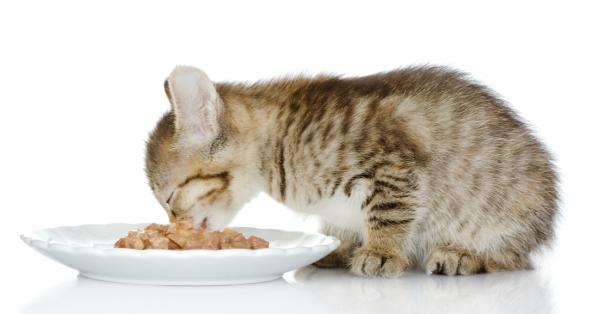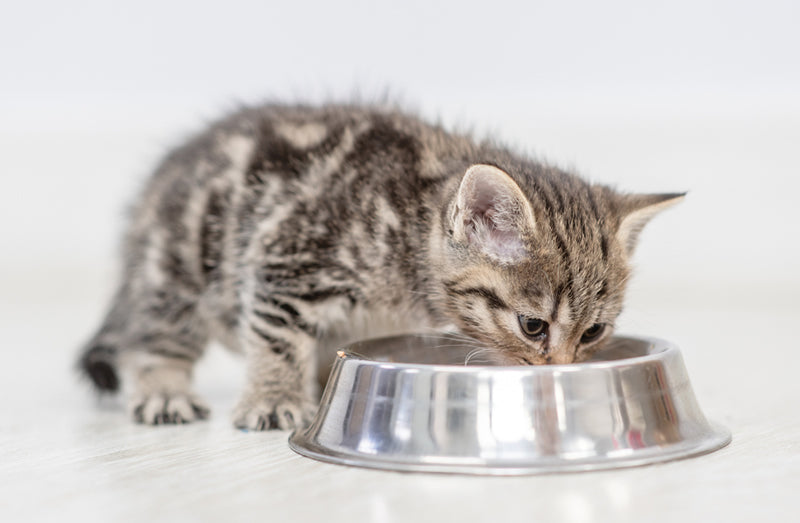Whether you are a novice or experienced cat parent, caring for a kitten is a tall order.
Like a newborn baby, a kitten is delicate, unpredictable, and mysterious. Half the time, you don’t know what is normal and what is not.
When she purrs too much, you will imagine she’s sick. If she stops purring altogether, you’ll still worry. You touch her little body round the clock to make sure she’s neither too hot nor too cold.
Kittens have extremely weak immune systems. They are prone to diseases, infections, and other disorders.
When you notice anything amiss, you should seek medical help immediately.
If your little friend shakes after eating, you have every reason to be concerned.
To help you discover what’s wrong with her, we have a detailed guide explaining why kittens shake after eating.
1. Introduction of Solid Foods
When eating solid foods for the first time, almost all kittens shake their bodies (especially their heads) both during and after eating.
If you have raised several kittens before, you have probably observed this already.
Hannah the Kitten Lady has a YouTube video showing three of her kittens shaking while eating meat for the very first time.
From the video, you can see one cat after another enjoying the meal while shaking their head at the same time.
Hannah calmly explains that this is a natural phenomenon. It is predictable enough to capture it on camera. She says that shaking during and after mealtimes happens when a kitten is weaned and a few times after.
Hannah is not the only one who claims that kittens shake when they take solid foods for the first time. Other pet parents in various cat forums echo the same sentiments as well. According to them, the shaking is pretty normal and goes away sooner rather than later.
The actual reason for kittens shaking after eating is not yet clear. Some believe that it takes the feline body sometime to catch up with the new food coming in.
Others claim that kittens enjoy solid food (especially meat) so much that they can’t help but shake as a sign of joy and contentment.
Whichever the reason, the fact is that this phenomenon is natural and harmless for the cat.
After a few feedings, the symptoms will die when the kitten gets used to solid food.
2. Other Causes

While the most likely reason your kitten shakes after eating is because of ingesting solids for the first time, there are other worrying causes to keep an eye on.
Let’s take a look at them below.
A. Digestive Issues
In case your kitten has been on solids for a while without any shaking episodes, chances are she has a digestive issue.
Perhaps she is bloated or has a runny stomach. During meals and after, she feels very uncomfortable to the point of shivering.
If you observe other symptoms such as vomiting, diarrhea, and lethargy, talk to your vet about them.
B. Difficulty eating
Another reason a kitten shakes during and after eating is that she has challenges getting food to godown.
To press it, the kitten may shake and tilt her head. This is a common occurrence for dry kibble as it is harder to chew than wet food.
Head tilts signify that the kitten uses extra force to crush the food in her mouth. This can also happen when eating large pieces of meat.
Shaking and tilting are done to rip and pull away bite-sized pieces from the meat.
C. Hypothermia
A kitten doesn’t have a very good mechanism to keep her warm at all times.
If her mother and siblings were around, she would curl around them for some warmth.
In their absence, she can easily get cold. Ideally, if you feel your kitten’s paws, tip of the tail, and ears and realize they are cold, it means she needs to be warmer.
According to PetMD, the normal feline temperature is 99.50 – 102.50F. If the mercury reading goes below 99, your cat can suffer hypothermia and may shake.
Besides shaking, a cat that is too cold will display other symptoms such as weakness, shallow breathing, and unresponsiveness.
D. Hyperthermia
Hyperthermia or fever can also cause a kitten to shake. At such a young age, a kitten is susceptible to infections, illnesses, and viruses.
If he catches something, his immune system can be easily overwhelmed.
To attack the incoming microbes, the body will raise its temperature causing chills. Temperature above 1020F signifies fever.
To be safe, keep a thermometer close to you at all times. Most importantly, have a first aid kit to help bring the temperature down.
Next, bring the cat to the vet for a wholesome treatment solution.
E. Weak muscles
If your kitten is under one month old, her shaking could be caused by weak muscles.
By this age, the feline muscular system is still developing. Things like standing too long, struggling to reach a bowl of food, and lifting the head can be too tasking for the fragile body.
You can tell your pet has weak muscles if you notice shivering during other times of the day besides feeding only.
Closing Thoughts
A kitten that shakes her head after eating is likely doing so because the food is new for her body.
If this is the case, she will stop shaking sooner than you expect.
However, if you observe any other worrying symptom along shaking, contact your vet. Your kitten could be sick and in need of medical attention.

Hi! I am Eleanor Price. I started this website after my cat, Louie, almost died from a case of botulism (a type of food poisoning often caused by bacteria that grow on food items). Turned out that my cat’s diet was the problem. I have made it my duty to provide the best information and recommendations about everything cat lovers need to know about their felines’ health and wellbeing. My goal is to find the most informative content on anything feline-related and share it with fellow hardworking kitty lovers.

